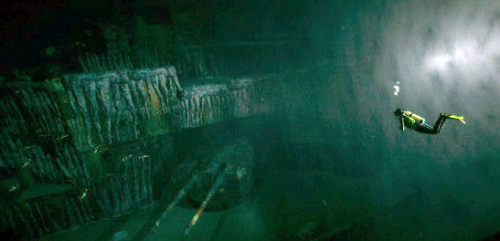Deep Dive
First having read the book of myths,
and loaded the camera,
and checked the edge of the knife-blade,
I put on
the body-armor of black rubber
the absurd flippers
the grave and awkward mask.
I am having to do this
not like Cousteau with his
assiduous team
aboard the sun-flooded schooner
but here alone.
There is a ladder.
The ladder is always there
hanging innocently
close to the side of the schooner.
We know what it is for,
we who have used it.
Otherwise
it is a piece of maritime floss
some sundry equipment.
I go down.
Rung after rung and still
the oxygen immerses me
the blue light
the clear atoms
of our human air.
I go down.
My flippers cripple me,
I crawl like an insect down the ladder
and there is no one
to tell me when the ocean
will begin.
First the air is blue and then
it is bluer and then green and then
black I am blacking out and yet
my mask is powerful
it pumps my blood with power
the sea is another story
the sea is not a question of power
I have to learn alone
to turn my body without force
in the deep element.
And now: it is easy to forget
what I came for
among so many who have always
lived here
swaying their crenellated fans
between the reefs
and besides
you breathe differently down here.
I came to explore the wreck.
The words are purposes.
The words are maps.
I came to see the damage that was done
and the treasures that prevail.
I stroke the beam of my lamp
slowly along the flank
of something more permanent
than fish or weed
the thing I came for:
the wreck and not the story of the wreck
the thing itself and not the myth
the drowned face always staring
toward the sun
the evidence of damage
worn by salt and sway into this threadbare beauty
the ribs of the disaster
curving their assertion
among the tentative haunters.
This is the place.
And I am here, the mermaid whose dark hair
streams black, the merman in his armored body.
We circle silently
about the wreck
we dive into the hold.
I am she: I am he
whose drowned face sleeps with open eyes
whose breasts still bear the stress
whose silver, copper, vermeil cargo lies
obscurely inside barrels
half-wedged and left to rot
we are the half-destroyed instruments
that once held to a course
the water-eaten log
the fouled compass
We are, I am, you are
by cowardice or courage
the one who find our way
back to this scene
carrying a knife, a camera
a book of myths
in which
our names do not appear.
I left the book. It didn’t have my name in it anyway.
And, after all, who cares? I can’t even tell why I had it – why anyone
has it. It is all a story, but created for what? What motivation could have
possibly prompted such imagination? This collection of tales has determined life, death, love, and hatred for so many. Why would they do such a thing?
But how could they know who would take their story and make it
into more than a myth?
Just to call it a myth gives it an identity – a label. Scripture.
Sacred. Irrelevant. Misinterpreted. What would they say now about the story? Would
they know how to respond to all the harm that has come from their musings?
Would they be sorry they wrote anything at all? Would they cry “foul!” at the
changes that have been made by those with another agenda, another motivation
other than theirs? Would they claim innocence at the blood that has been spilled
in the name of their myth, their story, their creation? Would they feel
responsible… or used?
I left the book of myths on the sea floor in the dark, in the cold. I
left it without a rope, like so much unwanted refuse that just gets thrown ‘away.’
And will my world be a better place without the book of myths that didn’t
contain my name? Will I miss the book that gave me so much comfort despite the
anguish, despite the lies? Will I think often of the book’s fate in the watery
deep all alone?
But further, will someone else find and take it as a treasure? And what
will become of them, what will be their fate living with the book of myths that
is lacking their name? Will they show it to others and convince them of its
value? Will they eventually leave it behind like I did? And what will be the residue?
[Postscript: I first heard this poem read aloud. Above is the response
that flowed from my hand. But, as I contemplate the poem further, the images
strike me again. What of those tools? A book of myths that doesn't contain my name because it was written in a different time to a different audience; a camera that records moments in time that only now exist in my memory; a sharpened knife to trim away what is no longer wanted or useful. Do I need more? If so, what? And then there is the wreck – what do we ‘do’
with that other than stare in amazement and a tinge of disbelief? What in the world are we to do with
the wreck of our history, both personally and collectively? Turn away? Pretend
it is something different, something more pleasant or desired? Can we make justifications or excuses, sidestepping our responsibility, negating the suffering? Or, are we supposed to face it squarely and let the
anger, frustration, and pain wash over us again? So many questions to which I
have no answers.]

Comments